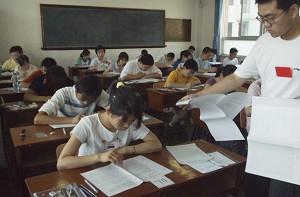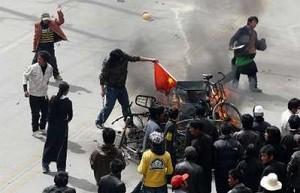China’s National Auditing Office recently released the 2003 auditing results of the financial statements of 18 universities under the Ministry of Education. The audit identified violations of financial regulations in these universities. Regarding this, the Sound of Hope Radio Network (Sound of Hope) interviewed Shandong University professor Mr. Sun Guangwen and Lin Mu, former secretary of China’s former General Secretary Hu Yaobang. Lin Mu expresses that regarding China’s education system, there are problems such as unequal opportunity, expensive tuition and difficult standards for admission. There are also issues with the course contents and teaching methods of China’s education system.
Professor Sun Guangwen expressed that one of the existing problems in China’s education system is the high tuition. For example, an undergraduate student has to pay 6,000-7,000 yuan (US$ 800) every year. The tuition varies among different departments and majors, with the science majors having even higher tuition. In addition, students have to pay for food and books. The relative amount of money a family spends on education is very large. It is very difficult for certain families, especially those in the countryside, to cover a university student’s expenses. The annual expense of a college student is as high as a farmer’s total gross income over several years. As such, high tuition is a major education problem. Former secretary Lin Mu states that the education fund from the Chinese regime’s budget only accounts for 53 percent of the total education expenses; the remaining 47 percent has to be provided by charging students for tuition and other fees. According to research by China’s Academy of Social Sciences, the average education related fees of universities, high schools and elementary schools account for 30 to 60 percent of a family’s income. To the low-income families and the medium-low income families that make up 80 percent of China’s population, education fees are secondary only to food expenses. Lin Mu considers that three big problems exist in the current education system.
The first problem is caused by the concept of “education commercialization” raised by some of the regime’s leaders. Schools of each level have kept raising tuition fees and other fees. Even the “free” elementary schools charge students several hundred yuan (US$ 50) as well. The fees are even higher in middle schools.
Lin Mu continued, “At present, there are various charges billed by schools. Some common and legal ones are ’school selection fees’ and ’sponsor fees’ by high quality middle and elementary schools. Some schools even bring the admission test score standard to a very high level, making students pay for an ‘insufficient score fee’ in order to get in. According to Yang Dongping’s research team at the Beijing Institute of Technology, research in ten cities and 40 good quality middle schools has shown that one fifth of students enter these schools by paying sponsorship fees and school selection fees.”
Professor Sun says that the commercialization of education is wrong, and it has tremendous drawbacks. Commercialization is based on making profits and increasing income. In this situation, schools will increase the students’ burdens through various ways. Schools are also obligated to pay bonuses to staff members. Some schools pay very high bonuses. Schools have three levels of positions for their staff members.
The first level includes the president, vice president, the Chinese Communist Party (CCP) secretary and the vice secretary, the deans and the assistant deans of each institute. These people are paid 50,000 yuan (US$ 6,000) per year. The second level staff members are paid 40,000 yuan (US$ 5,000), and the third level staff members are paid 30,000 yuan (US$ 4,000) per year. This money is all coming from students.
After implementing the commercialization, some high quality universities and colleges have used their reputations to increase fees. Students prefer to get into the name brand universities in order to get better jobs later on. Another way for these schools to earn money is to hold different kinds of training classes and grant certificates, such as the post-graduate class that grants the Master’s degree. These classes are not hard to get into as long as one can afford it, since the teachers only care about making money. As a result, the education quality has been seriously hindered.
Lin Mu mentioned that the average expense of an undergraduate student at an average school is more than 10,000 yuan (US$ 1,200). Some special majors require tens of thousands of yuan. An expert in this field once calculated and concluded, based on the ratio of the GDP and the people’s income, that the expense of China’s university is the highest in the world. The highest gross education fee is in Japan, which is about 110,000 yuan (US$ 14,000) per student. However, the GDP of Japan is more than 30,000 U.S. dollars while China’s GDP is only 1,200 U.S. dollars. Therefore, Chinese students’ expenses are twice as high as that of Japanese students, and accordingly, Chinese universities charge the highest fees.
Professor Sun believes that the government should provide sufficient education funds. He said, “Education funds should take up 4 percent of the GDP. Last year and the year before, the education fees were reduced to 3 percent. This has forced schools to go to become a commercialized industry to increase income. I feel that education funding is a very important problem. At present, schools with insufficient funds go to banks to apply for loans. Shandong University’s loan is more than ten billion yuan (US$ 130 million). Many schools have even higher loans than Shandong University. This is a crisis, right? You have to pay back the loan. If the government doesn’t give money, those universities have to offer classes to collect money or find other ways to make profits and to industrialize themselves.”
Lin Mu thinks the second major problem in education is that inequity in education worsens general social inequity. If the inherited social inequity continues to worsen, the position of the rich would become monopolized, while the condition of the poor will become entrenched down the generations. This rich-poor divide will thus be cemented. Future society will face the threat of disintegration. The children of low-income classes such as farmers and urban farm workers will find it more difficult to access education because they can’t afford the fees. Social inequity is thus reinforced, as access to education is the means by which poor people can enter the mainstream of society. As each generation of poor can’t afford to access education, the poor will always remain poor, from parent to child.
Another injustice in education is due to physical location, since education funding is partially provided by the local government. For example, the education funding in Shanghai used to be about ten times higher than in Henan Province, but now the difference has reached about 50 times. This problem will affect our children and later generations.
According to the surveys conducted by the related associations in the cities of Chengdu, Chongqing and Xi'an, about 43 percent of low-income people think that they cannot affect their social status through their own efforts. The nine districts in the city of Chongqing contain around 1.4 million farm workers, and the number of farm workers and their children who have entered the mainstream society is not even five percent. In 95 percent of the families, both generations of father and son are shoe-shiners or street vendors. According to the survey in Chengdu, among government workers, only 2.8 percent of people’s parents are farm workers while 26 percent of people’s parents are average employees.
Lin Mu thinks that the third problem in education is that the content and methods of education have become rigid and staid. The article, “Modernization and History Texbooks” by the contemporary historian, Professor Yuan Weishi, was interfered with and suppressed by the Propaganda Department of the Chinese Communist Party Central Committee and the Propaganda Department of Communist Youth League Central Committee. As a matter of fact, Mr. Yuan’s case is only the tip of the iceberg. According to my own research, the ancient, modern and world history as taught by middle school history textbooks, as well as middle school Chinese textbook all contain some ideological prejudices, let alone those textbooks on politics. We are therefore, inculcating students with incorrect knowledge, with some books even not reflecting established historical facts.
Professor Sun expressed that education should teach students science and knowledge that has been proven to be truth. He said, “I think some science textbooks are pretty good, many have been tested for many years, even hundreds of years, such as those in physics, math and chemistry. However, one kind of course in college, I think, has a very big problem. For example, some courses like ‘General Introduction to Mao Zedong’s Thoughts,’ which are compulsory for students. The content of those courses inculcate students with something useless, something that is even anti-scientific. They are taught for the purpose of promoting some communist ideology, leading people to believe that the CCP is mighty, glorious and correct, and that Mao Zedong is great. Many of these thoughts are false. For example, there are other courses that teach some of Deng Xiaoping’s theories and Jiang Zemin’s theory of the Three Representatives. I have written articles on such courses, and all of the courses should be stopped. Why inculcate college students with something not only useless, but also harmful, such as the concept of class struggle? The statements on history are somehow twisted. To inculcate students with these unreal and false thoughts in their education, I think is a very big problem.”
Lin Mu thinks that the root-cause for all those problems in education is due to the large rich-poor divide in today’s China. “What will occur in the future is that ‘workers’ sons will always be workers, while farmers’ sons will always be farmers.” He thinks another problem is that the government doesn’t treat education as a right of the citizens, but as the privilege of a few. Therefore, education is regarded as a profit-making enterprise. In addition, the political and cultural environments are forceful and autocratic, not allowing room for changes.
Professor Sun stated that the CCP firmly controls the education system and inculcates students with communist ideology. The CCP is naturally fearful of education and has sent its leaders to schools, wanting to monopolize those who have access to it. In each college, there is a CCP committee that is directly answerable to the party. The most important leader in the college is the secretary of CCP committee—even the president of the college comes second to that post. Such a school management system is limited by many factors. If you are to build a private college, is the president still answerable to the CCP committee? If the fundamental system isn’t reformed, then the education sector will be very difficult to develop.
Professor Sun believes in order to completely solve the problems in education, one has to change the system. Sun states, “Then a new generation of college graduates with high moral standards and scientific thoughts can be educated. The college CCP committee system should be abolished. The fundamental system is very important!”
China is the most populous country in the world, with an undereducated labor force that will become a heavy burden on the nation for a long time to come. China also has the largest illiterate and semi-literate population in the world. Among people over 15 years old, 0.18 billion people are illiterate and semi-literate, which is nearly 16 percent of the entire population.
Labor is China’s primary resource. Education is the prime means by which to develop this resource, but the current system is actually destroying this resource. Only a complete overhaul to the current system will further the lot of the masses. The development of China will thus have hope; otherwise, the hope for China’s economic and social development will be gone sooner or later.

